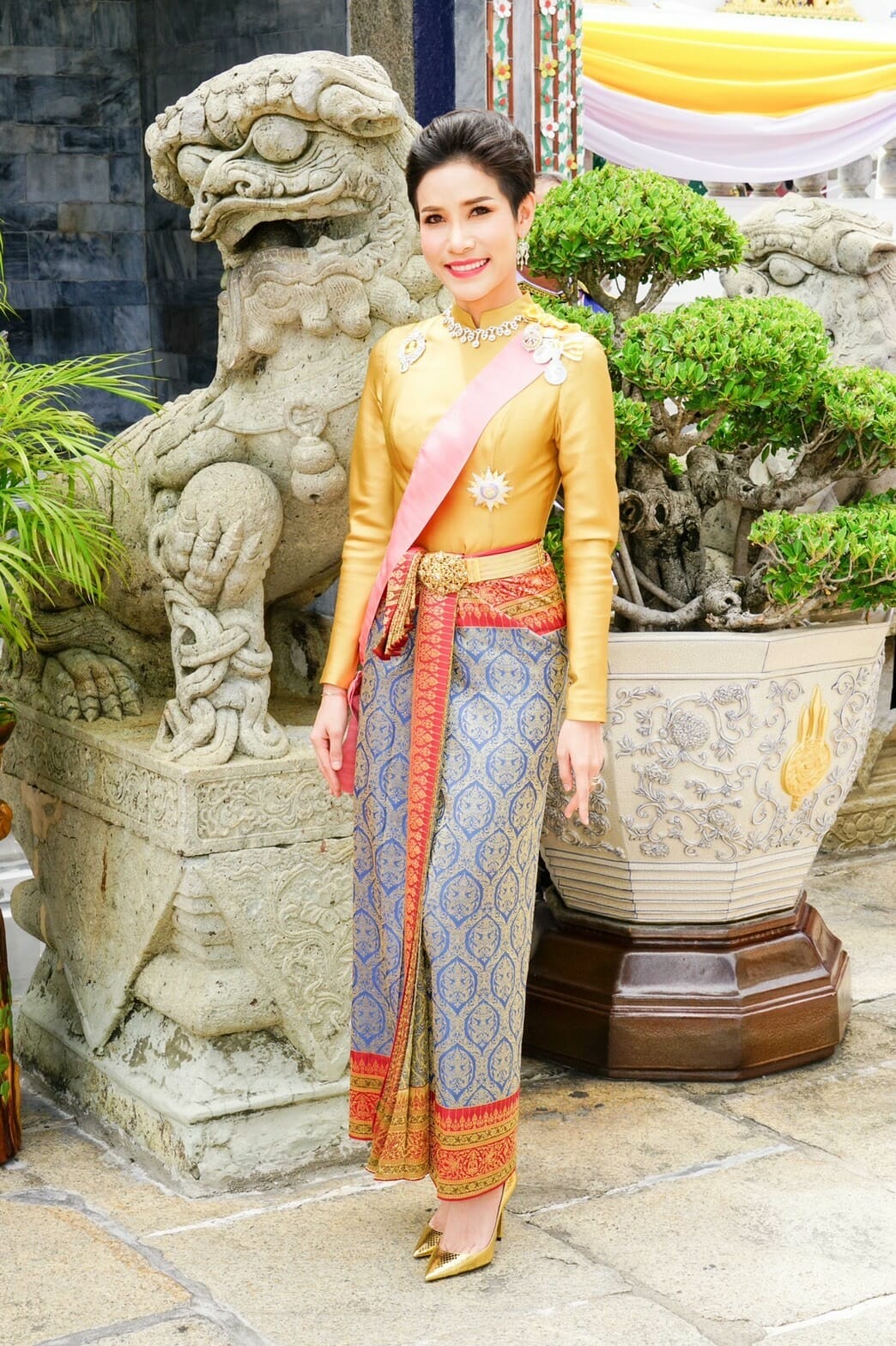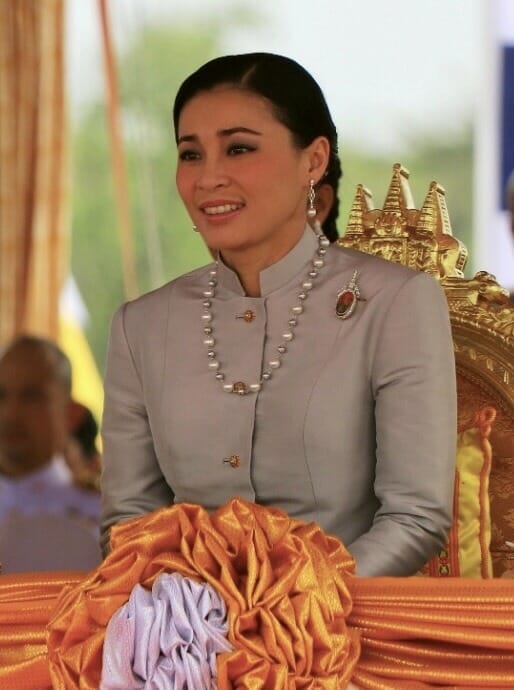Thailand’s King Maha Vajiralongkorn gave himself a birthday present – a new royal consort, no less than three months after he wedded another woman, a former air stewardess.
Both events greatly surprised the Thai public. Additionally, they have raised crucial questions of what this means for the direction of Thailand’s monarchy and its popular support.
Breaking with Tradition

The Thai royal noble consort Sineenat Wongvajirapakdi. Photograph: Royal Household Bureau
Sineenat Wongvajirapakdi, 34, an army nurse, was elevated to the position of Chao Khun Phra, or noble consort, on Vajiralongkorn’s 67th birthday in July. She became the first woman to receive such a prominent rank in nearly a century.
The last anointment of a noble consort took place during the reign of King Chulalongkorn, Vajiralongkorn’s great grandfather. Chulalongkorn had 92 wives, and was the last king to practise the long-held culture of polygamy in the royal family.
A few weeks after the televised anointment ceremony of Sineenat, whose full name is now Sineenat Bilaskalayani, the royal household released a set of the couple’s photos, breaking away from the royal tradition of conservatism. Some of them are intimate. One photo circulating shows the couple holding hands. It went viral on social media among Thais.
Supporters of the monarchy argue that Vajiralongkorn has embarked on a move to reinvent the Thai monarchy in his image, injecting a sense of modernity and trendiness.
But this argument falls flat as this supposed reinvention stands in stark contrast of other archaic practices which persist and were also demonstrated during the King’s coronation, including the medieval ritual of Sineenat’s prostration in front of the king.
Polygamy: An Uncomfortable Conversation
More critical is also what the King’s move to elevate Sineenat’s position to noble consort and official recognition of his mistress means for the legitimisation of polygamy in a society that remains deeply chauvinistic.
During the rule of King Bhumobol, King Vajirralongkorn’s father, the revered king carefully crafted an image of a family man to strengthen his own moral authority. Indeed, since the end of the Chulalongkorn reign, all successive kings had practised monogamy, with polygamy outlawed in 1935.
This shift went well with emerging new social norms elsewhere that champion a move towards a more egalitarian society and gender equality, even when in reality, Thai society has continued to suffer from the lack of female voices.
In this context, the elevation of Sineenat has not only failed to shore up support for the monarchy and reinforce the king’s legitimacy, she has set Thailand back and sunk those fighting for equality of the sexes.
Hurting the King’s Image
Long known to be a notorious playboy, now married four times, Vajiralongkorn may not realise that the announcement of Sineenat’s new position, coupled with the release of more photographs of her, will only put the monarchy in the media spotlight and remind people of his infamy. These can only cast more shadow on his early reign.
Official photos also portray Sineenat as an able pilot, a devoted soldier, and a diligent young lady, presumably to convey a message of royalism, patriotism and female toughness.
But there is a huge de-sync between this carefully constructed narrative of a devoted, nationalistic and noble royal as portrayed by the Royal Office compared to the previous international headlines suggesting that Sineenat and the King were close by May 2019 when he married the current queen.
Those photos of her strolling in Munich with Vajiralongkorn in a tiny tank top with fake tattoos could hardly make her a serious defender of the monarchy in the eyes of Thais.
The King’s Wives’ Club

The current Queen, Suthida, at the Royal Ploughing Ceremony, 2019. Photo: Wikipedia Commons
It is a tall order to rescue King Vajiralongkorn’s image. After three failed marriages, Vajiralongkorn himself has seemed to lose interest in fulfilling the institution’s role in projecting family values.
His first wife is Princess Soamsawali – a marriage that was arranged in 1977 and produced one daughter – saw him start an affair with a rising actress, who he went on to father five children with.
After wedding in 1994, Vajiralongkorn then kicked his second wife and all four boys out of the palace a few years later, accusing her of adultery, among other charges.
In 2001, Vajiralongkorn married for the third time. Srirasmi Suwadee bore him a son, Prince Dipangkorn Rasmijoti. But the marriage did not last. He divorced her in 2014, at the same time he was said to have started to see Suthida Tidjai, the current Queen of Thailand.
Little is known about the current Queen and what has transpired because Thais face a jail sentence of anything from three to 15 years for any critical comments on members of the royal family under Article 112 of the Thai Criminal Code.
Thailand in Crisis
The reality is that the Thai crisis that erupted over a decade ago has created a deep fissure among Thais. Thai royalists have drawn a line in the sand and defined Thai politics around the monarchy.
Espoused opinions on the monarchy can be fiercely divisive. Those who are seen to be acting against the interests of the monarchy can be victims in this ruthless political game.
Most comments made online about the appearance of Sineenat are a mix of real admiration and forced affection since criticisms of the monarchy are not tolerated.
But the advent of social media in Thailand, and the cloak of anonymity it affords has turned the tide somewhat. What comes with it are channels that give anti-monarchist elements a place to air their thoughts and spread through cyberspace.
The future of monarchy rests on the adaptability of the institution to changing political and social norms. This will depend on how much the monarchy can remain popular and compatible with Thailand’s changing norms.
This latest development, while originally contained within the walls of the palace, has now raised the stakes on whether the monarchy can still be seen as the beacon of morality for Thailand.
Capitalising on interest in his royal consort while trying to white-wash the King’s chequered past is a risky gamble and unlikely to endear him to his subjects.
FORSEA
Banner Image: Thailand’s King Maha Vajiralongkorn with royal noble consort Sineenat Wongvajirapakdi. Photograph: Royal Household Bureau
* Opinions expressed in this article are the author’s own and do not necessarily reflect FORSEA’s editorial stance.

